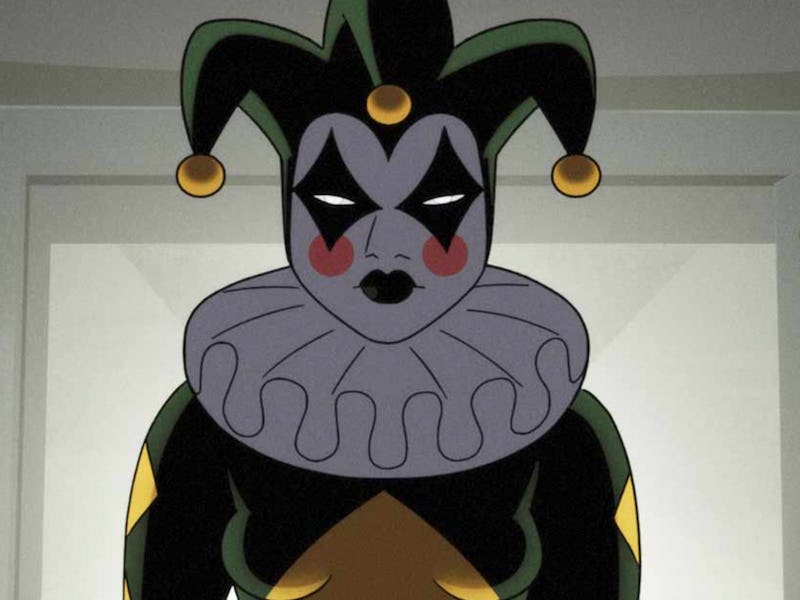The Most Ambitious Batman Show in Years
Batman: The Animated Series co-creator Bruce Timm could have played it safe. Thankfully, he made the opposite decision.

If you wanted to consume nothing but Batman-related content, you could easily go for years without running out of new material. Since the start of the 21st century, there have been over 10 different Batman movies, a handful of TV shows, and more video games that I can count. So you might assume that Hollywood would eventually run out of ways to reimagine the Dark Knight of Gotham City. Instead, the opposite seems true. The more Batman we get, the more writers, directors, and showrunners seemingly feel the pressure to flex their creative muscles with each reimagining of the 85-year-old superhero. Sure, not every new take on the character is a good one (see, Batffleck) but Bruce Wayne’s batting average is surprisingly high for an octogenarian, and the very latest version of Batman might be the most creative and enjoyable in years.
Streaming in its entirety now on Amazon Prime Video, Batman: Caped Crusader is a bold adaptation of the character from Bruce Timm, one of the brilliant minds behind arguably the best Batman adaptation ever: The Animated Series (along with some help from co-executive producers Matt Reeves and J.J. Abrams). But while you might expect Timm’s follow-up to be a direct sequel, or even a spiritual one, instead he’s delivered a fresh remix of the entire Batman universe. Caped Crusader takes some huge swings and largely connects to deliver the most ambitious tale of the Dark Knight in recent memory.
Light spoilers ahead for Batman: Caped Crusader.
Caped Crusader features a Batman who’s relatively new to the job... and not very good at it.
While Caped Crusader and The Animated Series share a similar hand-drawn Art Deco aesthetic, that’s where the similarities end. TAS was set in the show’s present of the 1990s, while Caped Crusader shifts the action back to a noir-soaked ‘40s. TAS followed a capable and unflappable vigilante, while Caped Crusader’s protagonist makes plenty of unforced errors. And while TAS often hewed closely to fan conceptions of Batman’s rogue’s gallery (even while inventing Harley Quinn out of thin air), Caped Crusader plays fast and loose with iconic supervillains. It all adds up to something refreshingly new, even if it also feels like a nod to classic DC storytelling.
Let’s dig in a bit more to each of those changes, starting with the setting.
While most Batman stories typically place the Dark Knight in our present moment (with the notable exception of the period piece Gotham by Gaslight), Caped Crusader brings us to Gotham in the 1940s. In an interview with Entertainment Weekly, Timm revealed that the main reason for this, aside from the cool visual motif, was to take smartphones and computers out of the equation. This turns out to be a brilliant move, giving the show a timeless feel and avoiding the tech-geek versions of Batman we’ve seen in more recent movies.
Bruce Wayne with Selena Kyle in Caped Crusader.
As for the Batman himself, Caped Crusader’s boldest decision is to make its hero undeniably terrible at his job. This is a Batman who typically makes things worse, whether he’s accidentally fueling mob warfare, pushing his friends to the brink of supervillainy, or just trying to get along with his butler (and, let’s be honest, BFF) Alfred Pennyworth. At least half of the entries in the show’s 10-episode first season end with Batman bashfully admitting he’s mucked things up yet again. To be fair, the other half end in success, but when your job is to save lives, that’s not a great split.
Finally, let’s talk about the villains. Batman’s rogues gallery is so well known that plenty of them have their own spinoff movies and shows. With that in mind, Caped Crusader makes the possibly controversial decision to reinvent some of those characters. Penguin is now a woman, for example, who dances onstage at the floating Iceberg Lounge while her idiot sons run a criminal empire below deck. The show reintroduces Harley Quinn (sans Joker) as a therapist who tortures and hypnotizes her richest and most deplorable clients — it’s a fun take on the character, but not nearly as memorable as classic Harley, who Timm co-created for The Animated Series, so we guess he can do what he wants. Clayface also gets a fresh origin story in one of the best episodes so far, while Harvey Dent is now a cynical politician whose transformation into Two-Face serves as a thrilling Season 1 finale that could go toe-to-toe with Christopher Nolan’s take on the supervillain in The Dark Knight.
Harvey Dent (aka, Two-Face) gets a drastic update in Batman: Caped Crusader.
While hardcore fans of Batman: The Animated Series may bristle at some of these changes, it’s hard to argue with the end result. Batman: Caped Crusader is one of the best takes on the Dark Knight in years, maybe even of the entire century so far. By looking to the past while pushing the franchise forward, the show proves once again that we’re still not even close to running out of new ways to tell the story of Bruce Wayne. Then again, after Caped Crusader, I pity whoever has to reimagine the character next — good luck, James Gunn!